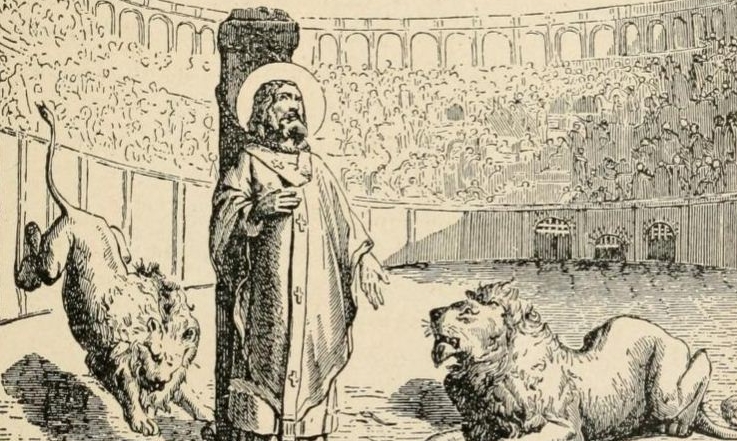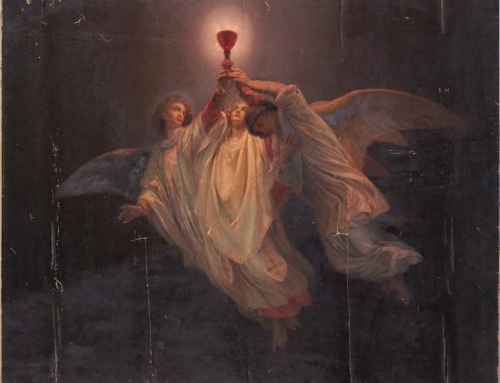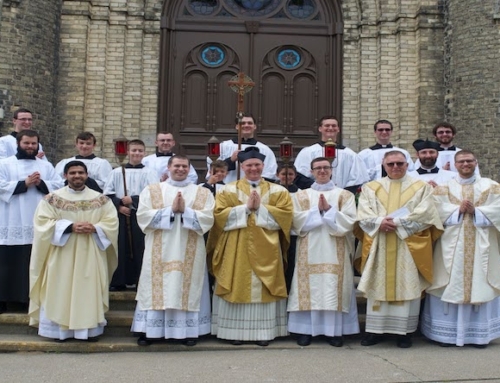Ignatius of Antioch was a bishop in the earliest days of the Church. He was martyred in Rome in the early 100s. On the way to his death, he wrote several letters to nearby Christian Churches, and—no big surprise—blood is a recurring theme. But one reference stands out among the rest.
To the Church in Ephesus, he wrote:
“Being imitators of God and rekindling yourselves in the blood of God, you have perfectly accomplished the work that was connatural to you.” (Letter to the Ephesians, 2)
The “blood of God”—what a mysterious phrase. Let us concentrate on this mystery. We often talk about the blood of Jesus, the blood of Christ. But the “blood of God?”
*****
Saint Ignatius is speaking out of the mystery of the Incarnation, the story that goes like this: The only-begotten Son of God was “born of the Father before all ages.” Then, this same person, the Son of God, was born in the town of Bethlehem at the center of history—born of the virgin Mary. He was still God. But now he was also man, and Joseph named him Jesus. This same Jesus taught, healed, and laid down his life for our salvation. He rose from the dead and ascended into heaven, where he sits on the throne of his Father.
This man, Jesus, is also God. So his mother is the mother of a man and the mother of God. His blood is the blood of a man and the blood of God. His death was the death of a man. And that man was also God. “For in him dwells the whole fullness of the deity bodily” (Col 2:9).
The Incarnation doesn’t change God at all. God can’t change. He is immortal, unchangeable, eternally alive. But it changes everything for us. It makes us talk in a new way. It means that we can reach out to Jesus and touch God. And when Jesus gave us his blood to drink—because he’s God—he poured out for us the blood of God.
*****
The Incarnation—this whole story—happened because God loves us and because we wouldn’t listen. God always wanted to say, “I love you like Adam loved Eve when he said to her, ‘bone of my bone and flesh of my flesh’” (Gen 2:23). God wanted to say, “I love you like someone willing to shed his blood for his beloved.” But we wouldn’t listen. We didn’t listen. How could God love us like that? God didn’t have flesh and bone. God didn’t have blood to shed.
God loved us, and so he decided to prove his love for us. The Word became flesh. And now Jesus, who is God, doesn’t just say, “I love you as if you were my flesh and blood.” He says, “My flesh and my blood!” He doesn’t just say, “I would die for you.” He says, “I died for you.”
Saint Ignatius knows that the blood of God was shed for us in the death of Jesus. This blood, he reminds the Churches, is poured out for us still, on the altar. “I desire the drink of God,” he writes to the Church in Rome (Letter to the Romans, 7). This blood lit a fire of love that carried Ignatius to his martyrdom. And this blood has the power to rekindle our love as well, so that we might “perfectly accomplish the work that is connatural to us,” that is, the work of love.
✠
Image: Little Pictorial Lives of the Saints (1894), Saint Ignatius, Bishop of Antioch







